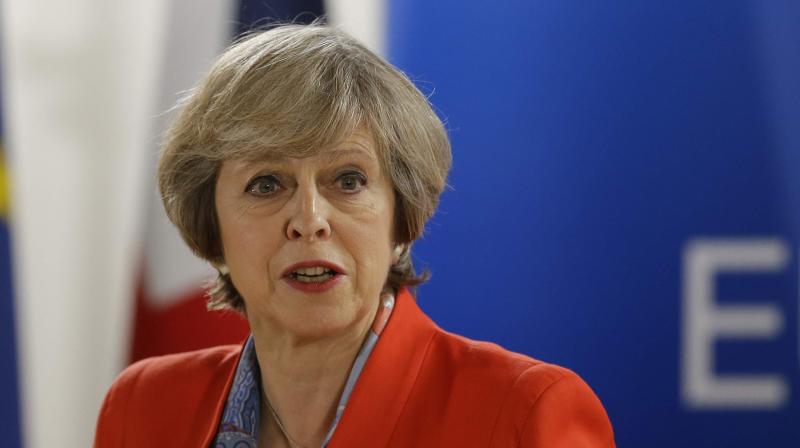Theresa May: Britain's 'no-nonsense' leader

London: British Prime Minister Theresa May, who on Tuesday called for a snap election, has forged a reputation as a no-nonsense pragmatist seeking to lead the country through one of the most tumultuous periods of its history.
Britain's second female leader after fellow Conservative Margaret Thatcher, May took over the helm of government in July last year after the country's shock vote to leave the European Union after four decades of membership.
She was officially -- but unenthusiastically -- in favour of Britain staying in the European Union and had kept a low profile throughout the often poisonous and polarising campaign.
But after stepping into the political vacuum left by David Cameron's decision to quit -- becoming prime minister without winning an election -- her constant refrain was "Brexit means Brexit".
But she faced a struggle to keep together a country deeply divided by the referendum, with Scotland planning to hold a new referendum on its independence.
After formally launching the divorce process from the European Union in late March, May insisted there could be "no turning back" from the historic decision and appealed for national unity.
'Bloody difficult woman'
The clergyman's daughter was once labelled by senior Conservative Kenneth Clarke in an unguarded moment, a "bloody difficult woman."
But the 59-year-old claimed this was the very quality which would stand her in good stead for the battles ahead.
May was born Theresa Brasier in the southern English seaside town of Eastbourne in 1956.
Her father Hubert was an Anglican clergyman, one of several points which has drawn comparisons between May and German Chancellor Angela Merkel.
Her education -- at a series of little-known state and private schools -- has been contrasted with the elite Etonian background of Cameron and many in his so-called "Notting Hill Set" circle.
Like Cameron, she attended Oxford University but kept a low profile. It was here that she met her husband Philip, a banker - they were reportedly introduced by Pakistan's Benazir Bhutto.
The couple married in 1980 but were unable to have children. May's rival Andrea Leadsom withdrew from the leadership race two days after comments were published suggesting this made her less qualified to be prime minister.
'The nasty party'
May worked in finance, including at the Bank of England, before being elected as MP for the London commuter town of Maidenhead in 1997.
As Conservative chairwoman in 2002, she made waves by suggesting the Tories were seen as "the nasty party" and needed to overhaul their image - although under Cameron's leadership, they did so.
When the Conservatives won the 2010 general election, May was named home secretary, seen as one of the hardest jobs in government which has wrecked a string of other political careers.
But May kept the job for six years -- the longest serving interior minister since 1892. Supporters say her achievements in that post include deporting radical cleric Abu Qatada to Jordan -- where he was later freed after a decade of legal cases -- and standing up to the Police Federation, the powerful police officers union, to try to address a string of scandals.
In 2013, May revealed she has type 1 diabetes but insisted it would not affect her career, saying it was a question of "head down and getting on with it".
While widely respected, she is not part of any clique in the corridors of power in Westminster, acknowledging that she does not drink in parliament's many bars or "gossip about people over lunch".
A source who has worked closely with her once told AFP on condition of anonymity that she was "incredibly hard-working".
"She's always got up three hours before everybody else and knows five times more than anyone else in the room," the source said.
"Theresa is not going to do anything radical ... she's incredibly risk-averse, a safe pair of hands." May has little time for hobbies but is well known for her collection of leopard-print kitten heels and enjoys cooking and taking walking holidays with her husband.

